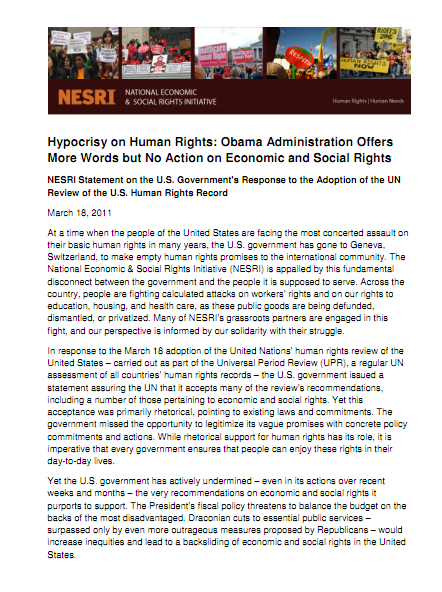Hypocrisy on Human Rights: Obama Administration Offers More Words but No Action on Economic and Social Rights

NESRI Statement on the U.S. Government's Response to the Adoption of the UN Review of the U.S. Human Rights Record
– Read a version of this statement in the Huffington Post
At a time when the people of the United States are facing the most concerted assault on their basic human rights in many years, the U.S. government has gone to Geneva, Switzerland, to make empty human rights promises to the international community. The National Economic & Social Rights Initiative (NESRI) is appalled by this fundamental disconnect between the government and the people it is supposed to serve. Across the country, people are fighting calculated attacks on workers’ rights and on our rights to education, housing, and health care, as these public goods are being defunded, dismantled, or privatized. Many of NESRI’s grassroots partners are engaged in this fight, and our perspective is informed by our solidarity with their struggle.
In response to the March 18 adoption of the United Nations’ human rights review of the United States – carried out as part of the Universal Period Review (UPR), a regular UN assessment of all countries’ human rights records – the U.S. government issued a statement assuring the UN that it accepts many of the review’s recommendations, including a number of those pertaining to economic and social rights. Yet this acceptance was primarily rhetorical, pointing to existing laws and commitments. The government missed the opportunity to legitimize its vague promises with concrete policy commitments and actions. While rhetorical support for human rights has its role, it is imperative that every government ensures that people can enjoy these rights in their day-to-day lives.
Yet the U.S. government has actively undermined – even in its actions over recent weeks and months – the very recommendations on economic and social rights it purports to support. The President’s fiscal policy threatens to balance the budget on the backs of the most disadvantaged. Draconian cuts to essential public services – surpassed only by even more outrageous measures proposed by Republicans – would increase inequities and lead to a backsliding of economic and social rights in the United States.
If the government was serious about meeting its human rights obligations, it would instead design spending and revenue policies that meet people’s fundamental needs, such as education, housing, health care, food, and work. There is precedence for this in U.S. history: the Great Depression and strong popular movements prompted Franklin D. Roosevelt’s New Deal policies, which led to the Social Security Act, the National Labor Relations Act, and large-scale public jobs programs, followed by his proposal for an economic bill of rights. If President Obama were inclined to follow this example, he would take a lead in championing the provision of essential public goods through concrete financing proposals and policy initiatives. Yet, regrettably, that is not the leadership we have seen. This Administration has not treated domestic human rights as non-negotiable components of the policy process, and the President has failed to stand up and defend our rights. On the contrary, at the same time as the already minimal social safety net is being gutted to the core, the Administration has continued to support subsidizing the egregious actions of the corporate financial sector and extending tax cuts for the wealthy. It has failed to pursue an equitable tax policy that raises resources for meeting people’s fundamental needs.
Moreover, key policies of this Administration entail a market driven, rather than human rights based approach, such as privatizing public housing and increasing displacement, and leaving insurance profiteers in the role of gatekeepers restricting access to health care. Underlying these dramatic policy failures are significant structural barriers to realizing economic and social rights in the United States. To ignore these, as the government does, means to deprive us of an opportunity for fundamental change. Privileging market imperatives over human rights has led to inequality and impoverishment, driven by privatization and a shift from direct public service provision to market competition.
As we reflect on the suffering caused by the denial of human rights in the United States, the government’s response to the UN review becomes a symbol of the hypocrisy of the U.S. political establishment, which sings the praise of human rights internationally yet continues to deprive us of those very rights at home.
Download this statement here.
As part of the Universal Periodic Review, NESRI and its partners and allies submitted a report on economic and social rights in the United States to the United Nations. Download the report and other materials here.
On March 25, 2011, the Human Rights at Home Campaign also issued a statement critizing the disconnect between the Obama Administration's words and actions.
